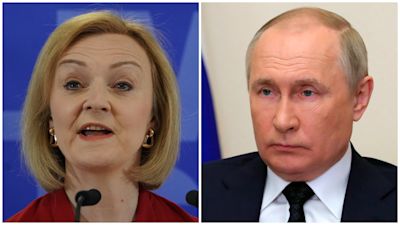Liz Truss: ‘Not a word’ Putin says can be trusted after Russian blasts hit Ukraine port

Marc Mallett reports after Russian missiles rained down on Odesa hours after Moscow agreed to let grain exports start again
Foreign Secretary Liz Truss has said Russia's attack on a Ukrainian city just hours after Moscow signed a deal to allow grain exports to start up again is proof Vladimir Putin cannot be trusted.
The Tory leadership hopeful said the hit on the Black sea port of Odesa on Saturday was "completely unwarranted," and showed "not a word" the Russian president said could be believed.
It comes after Ukraine accused Mr Putin of having "spat in the face" of the UN and Turkish leaders who had brokered the deals.
Speaking at a campaign event in Kent, Ms Truss said: “It is absolutely appalling that only a day after striking this deal, Vladimir Putin has launched a completely unwarranted attack on Odesa.“
"It shows that not a word he says can be trusted, and we need to urgently work with our international partners to find a better way of getting the grain out of Ukraine that doesn’t involve Russia and their broken promises."
On Friday, Russian and Ukrainian officials signed a pair of twin deals brokered by Turkey and the UN to resume much-needed exports.
It was hoped the deal would lead to Ukraine being able to export 22 million tons of grain and other agricultural products that have been stuck in Black Sea ports due to the war.
But on Saturday, Ukrainian Foreign Ministry spokesman Oleg Nikolenko said Russia had launched a missile attack on the port of Odesa, "breaking its promises and undermining its commitments."
Ukrainian MP Oleksiy Goncharenko said two Russian missiles had hit the port, with a further two intercepted. The politician added there were a number wounded.
Command spokeswoman Nataliya Humenyuk said no grain storage facilities were hit in Odesa.
But Turkey's defence minister said he had spoken with Ukrainian authorities and one missile struck a grain silo and another landed nearby, but neither affected loading at Odesa's docks.
Mr Nikolenko said if exports were held up, "Russia will bear full responsibility for [a] global food crisis."
In a post on Facebook, the official said the actions amounted to "Vladimir Putin spitting in the face of UN Secretary General and Turkish president who made enormous efforts to reach an agreement."
UN Secretary-General Antonio Guterres described the deal as "an agreement for the world" at the signing ceremony in Istanbul on Friday.
His office said on Saturday that the UN chief “unequivocally condemns” the strikes.
Watch Global Security Editor Rohit Kachroo's report from the night the deal was signed
Ukraine is one of the world’s largest exporters of wheat, corn and sunflower oil, but Russia’s invasion of the country and naval blockade of its ports have halted shipments.
Some grain is being transported through Europe by rail, road and river, but the prices of vital commodities like wheat and barley have soared during the nearly five-month war.
It is hoped the deal will alleviate immediate pressures on the global food market but with the war still raging there are fears many of Ukraine's farms will be unable to plant their next crops.
It was not clear how Saturday’s Russian airstrikes would affect the plan to resume shipping the grain by sea in safe corridors out of three Black Sea ports: Odesa, Chernomorsk and Yuzhny.
The lack of exports has already led to a crisis in many nations that rely on Ukrainian grain.
In Kenya, the International Rescue Committee (IRC) says more than 18.4 million people “are already on the verge of starvation, about half of them children”.
In Nigeria, breadmakers went on strike after soaring production costs left many bakeries operating at a loss.
Several other countries in Africa have also experienced similar difficulties. This is being driven by a drought in the country and also a lack of grain imports.
Want a quick and expert briefing on the biggest news stories? Listen to our latest podcasts to find out What You Need To Know.